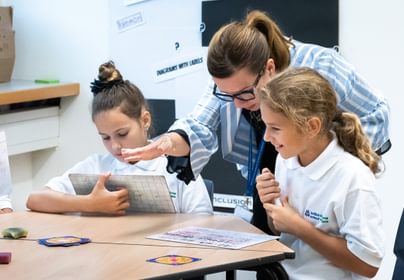One question that every good school around the world will (and should) come to ask is: “How can we provide a learning environment in which every child matters?”
BISL has grown from its original 23 students and 10 staff to 230 students and 50 members of staff. Our community contains parents, pupils and staff from over 30 different nationalities, diverse cultural and educational backgrounds. BISL, from its very first steps, has been open to diversity and has embraced differences.
When it comes to SEND (Special Educational Needs and Disabilities), statistics show that these are on the increase among the student population across the world, including difficulties associated with emotional and behavioural problems. Reasons for this vary, but one common factor is that needs are now more easily identified and programmes are available to support the students with SEND.
With the growing student population at BISL, there is naturally a growing number of students that have been/or will be identified to have special educational needs. BISL currently accommodates students with mild general learning disabilities and specific learning difficulties such as dyslexia, dyscalculia, difficulties with working memory and processing, speech and language disorders, and dyspraxia. Other types of difficulties are related to ADHD (Attention and Hyperactivity Disorder) and Sensory Disorders. A small percentage of students have educational needs related to forms of Autistic Spectrum Disorder. For more information on specific SEN areas, please see the links below.
Most students come to BISL having not had their needs identified beforehand. This is not uncommon, since learning difficulties can only really be noticed once the child is in an educational setting. Even then, it can take years to discover why a child is struggling in certain areas of learning, as it goes unnoticed or parents (understandably) may not wish to assess and expose their child’s difficulties for fear of labelling their child. The fact is that any child may find themselves needing some form of support at any time in their school life, be it educational, emotional or social issues that they face.
In BISL, the process of identification of student needs starts with concerns from teachers or parents that a student is showing consistent and increasing signs of struggling with learning, concentration, social integration and so on. Such concerns are reported to the SENCo with observations and evidence gathered to support them. From this point, the student is monitored by the SENCo and/or SEN specialist and specific strategies put in place to accommodate the student’s needs during lessons. Parents, teachers and staff work together to ensure the best provision at school and at home.
Students with identified special needs are usually provided with an Individual Education Plan (IEP): a plan of work set for achieving short and long term personal targets. Strategies and adaptations are set for teachers to use in order to enable the student to work at their optimum ability. Additional support may be organised for specific learning difficulties, in the form of 1-1 or small group out-of-class support, in-class support, exam access arrangement and adapted assessments. For students requiring higher-level support, specialist staff may be brought in to work together with the student, parents and staff. The early identification, assessment and provision for any child with special needs is most important. It is crucial for effective action, planning and communication with parents and with the whole school community.
Here, let me return to the question posed at the beginning and expand on it further:
“How do we continue to build confidence in the BISL community, so that every parents feels that their child matters?”
We continue to educate students, teachers and parents about what it means to ‘be’ or ‘have’ a child with SEN, to understand not only that we are all different, but also how learning about these differences can help us in understanding ourselves better. Including special needs children in a classroom benefits all students socially, emotionally and academically. It comes with challenges, but patience and effort makes it a fulfilling process. Teachers and parents also gain enormously from experts working with students on various areas, through seminars, guidance and support within lessons. See this link for an interview with one such specialist working together with us at BISL.
Every child, regardless of their circumstances, should have access to the best education and opportunities, and every parent wants to ensure this best education for their child. Working together as a community, instilling in students the importance of ‘caring for each other’, (in my humble opinion) is the answer to the question.
Written by:
Katarina Zelezinger (SENCo)
Emina Begić (SEN and Learning Support Teacher)
Lea Šprah (SEN and Learning Support Teacher)



